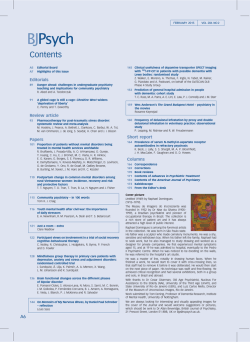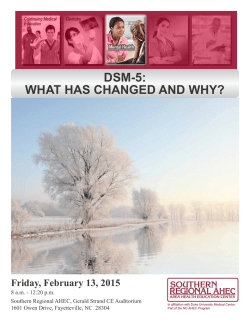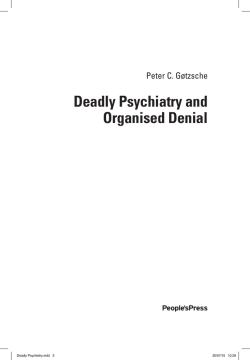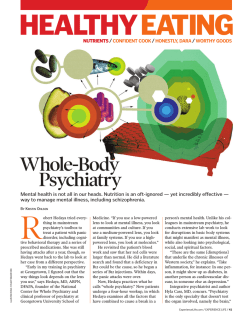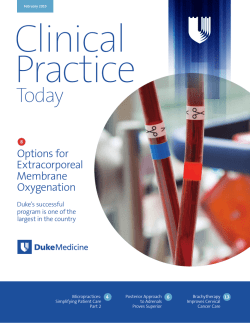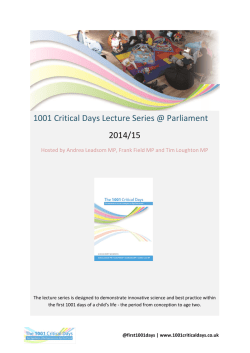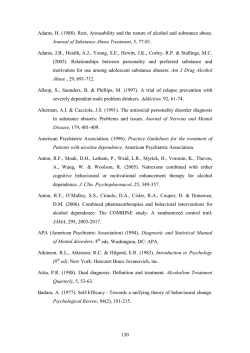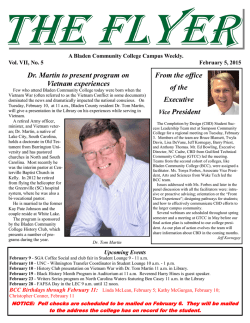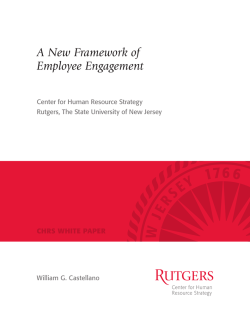
2015 Clinical Update - Southern Regional AHEC
2015 Clinical Update and Psychopharmacology Review Featuring JESSIE CLOSE Mental Health Advocate Earn up to 10.0 AMA PRA Category 1 Credit™, CNEs, NBCCs and NAADAC hours! February 26-27, 2015 McKimmon Conference Center 1101 Gorman Street • Raleigh, NC 27606 In affiliation with Duke University Medical Center Part of the NC AHEC Program Jointly provided by: 2015 Clinical Update & Psychopharmacology Review Featured Speaker: Jessie Close Jessie Close will be the featured plenary speaker at 2015 Clinical Update and Psychopharmacology Review. Jessie Close wants to change how people talk and think about mental illness. An ambassador for Bring Change 2 Mind, a not-for-profit organization founded by Jessie’s sister, actress Glenn Close, Jessie fights stigma and misunderstanding to create a clearer picture of mental disorders. Her own struggle with bipolar disorder and alcoholism provides the backbone to a courageous story and an enlightened perspective on the state of mental health in America. Life has been a whirlwind for Jessie, who lived with anxiety, confusion and paranoia. As a teenager, she dropped out of high school and contemplated suicide. Jessie recalls, “I lived many years without medication, then, at age 45, I was put on two medications for bipolar disorder. I drank to calm the mania.” She was an alcoholic and mentally unstable. Then her eldest son, Calen, was diagnosed with schizo-affective disorder, a form of schizophrenia. Jessie asked her sister, Glenn, to help battle the stigma and misunderstanding of mental illness. “It’s one thing to be aware of stigma in your own life but when Calen lost all his friends, I couldn’t bare it.” In 2009, Glenn founded BringChange2Mind.org, an outreach and stigma-fighting mental health advocacy group that provides invaluable resources and inspiration to people and families in need. October 2009 saw the start of the organization’s first national anti-stigma campaign. Award-winning filmmaker Ron Howard directed the first commercial, which highlighted how mental illness affects the whole family. Resilience, Jessie’s memoir, was recently released. She will be available to sign her book for conference attendees at the Quail Ridge Books booth. Jessie also blogs about living with mental illness for BringChange2Mind.org and has made appearances on Good Morning America, Katie, Erin Burnett, and Piers Morgan. Additional Featured Speakers Lori Raney, M.D. Jeff Swanson, Ph.D. Topic: "Gun Violence and Mental Illness" Topic: "Evidenced Based Approaches to Integrated Care" Andy Short, Ph.D. and Allan Chrisman, M.D. Topic: "Mental Health in Disaster Response" Lisa Amaya Jackson, M.D., MPH Topic: "Addressing the Impact of Trauma on Children" Courtney Cantrell Topic: "The State of Mental Health Services in North Carolina" 2015 Clinical Update & Psychopharmacology Review This annual conference is jointly sponsored by: Southern Regional AHEC Wake AHEC North Carolina Psychological Association North Carolina Psychiatric Association Duke Department of Psychiatry North Carolina Division of MH/DD/SAS UNC Department of Psychiatry Governor’s Institute on Substance Abuse About the Location The McKimmon Conference and Training Center hosts an average of over 2,000 events with more than 200,000 people coming through the Center each year. McKimmon Conference and Training Center • 1101 Gorman Street • Raleigh, North Carolina 27606 Hotel Accommodations Holiday Inn Express Hotel & Suites 3741 Thistledown Drive Raleigh, North Carolina 27606 STAY SMART® with us here at, the Holiday Inn Express Hotel & Suites near NC State! Rooms have been blocked at a discounted rate of $94.99/night. Reservations must be made no later than February 11, 2015. To make reservations, call 919-854-0001 or 1-800-HOLIDAY. Guests should request group code CUR or group title Clinical Update 2015. For your convenience, reservations can also be made using the link below: http://www.hiexpress.com/redirect?path=hd&brandCode=ex&localeCode=en®ionCode=1&hotelCode=RDUGS&_PMID=99801505&GPC=CUR Directions Heading East on I-40 take Exit # 295. Turn left onto Gorman St. follow for approximately .5 miles. Turn right onto Thistledown Dr. and hotel will be on the right. Heading West on I-40 take Exit # 295. Then turn right onto Gorman St. follow Gorman St. approximately .5 miles. Then turn right onto Thistledown Dr. hotel will be on the right. The hotel is about four (4) minutes from McKimmon Conference & Training Center. 2015 Clinical Update & Psychopharmacology Review Purpose and Target Audience 2015 Clinical Update & Psychopharmacology Review provides information on the most recent therapeutic and medical approaches to the treatment of mental illness, developmental disabilities and substance abuse. This important conference continues in its tradition of providing quality content for practitioners engaged in providing mental health, developmental disability, and substance abuse services in North Carolina. Important topics covered will include: • Evidence Based Practice in Autism • Treatment Resistant Depression • DSM-5 with the IDD Population • Ethical Decision-making in Behavioral Health Psychiatrists, psychologists, pharmacists, nurses, therapists, counselors, case managers, substance abuse professionals, and others will find a variety of topics on the agenda designed to meet their educational needs. Objectives Upon completion of this conference, participants will be able to: • Provide information on the most recent therapeutic and medical approaches to the treatment of mental illness, developmental disabilities, and substance abuse disorders; • Identify cutting edge psychopharmacology and clinical updates on relevant medications and approaches to psychiatric treatment; and • Describe effective clinical practice guidelines and interventions to serve the populations in North Carolina. "I am in an MCO (managed care organization) and this information can go towards best practice standards and medical necessity." -2013 Clinical Update and Psychopharmacology Review Attendee Planning Committee John Bigger, MS, LPC Southern Regional AHEC Robin Huffman North Carolina Psychiatric Association Russet Rogers, MLS Southern Regional AHEC Marvin Swartz, M.D. Duke University Medical Center Jennifer Borton, RN, MSN Southern Regional AHEC Sally Cameron North Carolina Psychological Association Andrea Novak, Ph.D., RN-BC, FAEN Southern Regional AHEC Jack Naftel, M.D. University of North Carolina, Chapel Hill Nena Lekwauwa, M.D. NC Division of MH/DD/SAS Would your company be interested in exhibiting at this conference? Please go to this link for more information: http://www.southernregionalahec.org/ContinuingEd/exhibitor.html AGENDA Thursday, Feb. 26, 2015 7 a.m. Exhibitor Registration and Set-Up 8 a.m. Registration - Visit Exhibitors 8:55 a.m. Welcome and Housekeeping John Bigger, MS, LPC 9 a.m. Opening Plenary Resilience in Mental Health Jessie Close Objectives: • Discuss what someone feels like who has mental illness; and • Explain the importance of empathy in helping someone to overcome mental illness. 10:30 a.m. Break - Visit Exhibitors 11 a.m. Breakout Sessions I A) Gun Violence and Mental Illness: Balancing Risk and Rights for Effective Policy Jeff Swanson, Ph.D. Objectives: • Describe the evidence for the association between mental illness and violent behavior and suicide; • Explain the traditional approach to firearms restrictions applied to certain persons with mental disorders in federal and state laws in the United States; and • Discuss an alternative evidence-based approach to firearms restrictions, known as “risk-based firearms policy,” which is focused on time-sensitive behavioral indicators of risk and history of violent behavior, rather than mental illness per se. B) Treatment Resistant Depression: A State of the Art Evidence-based Review Bradley N. Gaynes, M.D., MPH Objectives: • Review the current evidence base for identifying and managing treatment resistant depression; and • Correctly identify and develop a treatment plan for a patient with treatment resistant depression. C) Geriatric Mental Health Services: Navigating the Maze Ann Louise Barrick, Ph.D. and Jennifer Shrewsbury, MSW Objectives: •List symptoms associated with the three most common mental health issues that impact functioning in older persons; •Identify relevant tools for assessing service needs in older persons; •Name one of the most useful outpatient services and the pathway for obtaining these services; and •Describe current inpatient services and methods for accessing them. D) Ethical Decision-making in Behavioral Health Tim Slaven, Ph.D., LPC, NCC (Need Ethics hours? In addition to this session, you may attend 2D and 3D for a total of four (4) hours. Must attend 1D, 2D and 3D consecutively.) Objectives: • Describe the significant principles related to ethical conduct; •Explain the major ethical issues in the field of behavioral health; •Review the various approaches to ethical decisionmaking; and •Apply the ethical decision-making model to a case study. 12:15 p.m. Lunch provided - Visit Exhibitors 1:30 p.m. Breakout Sessions II A) Adopting Medication Assisted Treatment as a Best Practice in Substance Abuse Treatment Paul Nagy, M.S., LPC, LCAS, CCS and Ashwin Patkar, M.D. Objectives: •Describe approved medications used to treat substance dependence; •Discuss clinical strategies for utilizing medications in treatment of substance dependence; •Review usual concerns associated with medication assisted treatment; and •Identify clinical challenges and review guidelines for combined behavioral and medication assisted treatment. B) Intellectual and Developmental Disability in the age of DSM-5 Rob Christian, M.D. Objectives: •Describe the differences in the DSM-IV and DSM-5 in relation to IDD disorders; •Explain how the diagnostic criteria can be applied to various disorders; and •Discuss the treatment implications regarding the changes in the diagnostic criteria. C) Addressing the Impact of Trauma on Children: State and National Efforts Lisa Amaya Jackson, M.D., MPH Objectives: AGENDA •Describe the impact of adverse life events and trauma on children and the Evidence Based Treatments design; and •Describe state and national efforts to address trauma’s impact on children & families. D) Ethical Decision-making in Behavioral Health Tim Slaven, Ph.D., LPC, NCC (continued from 1D) 3 p.m. Break - Visit Exhibitors 3:30 p.m. Breakout Sessions III A) Perinatal Mood and Anxiety Disorders Mary Kimmel, M.D. Objectives: •Describe perinatal mood and anxiety disorders (PMAD) during pregnancy and the postpartum period •Discuss known risk factors for PMAD and possible etiologies; and •Discuss appropriate management of PMAD. B) Mental Health in Disaster Response: Issues and Interventions Andy Short, Ph.D. and Allan Chrisman, M.D. Objectives: •Discuss issues for mental health professionals working in disaster response; •Describe the nature of effective mental health interventions in disaster settings; •Explain how cultural factors & differences play a role in disaster response and interventions; and •Discuss ethical issues confronting mental health professionals in disaster response. C) CBT and Anxiety in Children Chris Mauro, Ph.D. Objectives: •Describe childhood anxiety; and •Review the components of the CBT approach in children. D) Ethical Decision-making in Behavioral Health Tim Slaven, Ph.D., LPC, NCC (continued from 1D/2D) 5 p.m. Adjourn Friday, Feb. 27, 2015 8 - 9 a.m. Registration - Visit Exhibitors 9 a.m. Plenary Session Evidence Based Approaches to Integrated Care Lori Raney, M.D. Objectives: •Discuss the evidence base for the collaborative care model and variations in different populations; •List the key members of the collaborative care team and describe their specific roles and responsibilities; and •Identify the cultural differences between primary care and behavioral health and how to address team dynamics. 10:30 a.m. Break - Visit Exhibitors 10:45 a.m. Breakout Sessions IV A) Evidence Based Practice in Autism Aleck Myers, Ph.D., LP; Louise Buchholz Southern M.Ed., BCBA; and Whitney Luffman, MA, LPA, BCBA Objectives: • Identify criteria for a practice to earn the label “Evidence Based Practice"; •Identify larger methodological umbrellas under which best practices in autism intervention fall; and •Identify fundamental principles and strategies that are often applied within quality intervention programs. B) Psychopharmacology of Dementia Julia O. Lunsford, M.D. Objectives: •Describe the approved drugs to treat dementia; •Discuss the drugs that may be used to target mood changes associated with dementia; •Explain the drugs that may be used to target difficult behaviors associated with dementia; and •Discuss non-pharmacological approaches to behaviors associated with dementia. C) Evidence Based Approaches to Integrated Care Lori Raney, M.D. Objectives: •Describe how the roles of the key members of the collaborative care team work together to meet the needs of the patients being served; and •Review how team dynamics contribute to patient care. AGENDA D) Substance Abuse and Pregnancy Hendree Jones, Ph.D. Objectives: •Compare and contrast the risks and benefits of using different agonist medications to treat opioid use disorders during pregnancy; •Identify the myriad of factors that affect the substance exposed infant and mitigate or exacerbate Neonatal Abstinence Syndrome (NAS); and •Compare and contrast the effects of prenatal exposure to marijuana, benzodiazepines, alcohol and stimulants. 12 p.m. Lunch provided - Visit Exhibitors 1:20 p.m. Presentation The Second Annual Advancing Evidence Based Practices Award John Bigger, MS, LPC and Marvin Swartz, M.D. 1:30 p.m. Closing Plenary The State of Mental Health Services in North Carolina Courtney Cantrell Objectives: •Describe the current service delivery system in North Carolina and prospective changes to occur in 2015; and •Discuss how providers can be prepared for these changes to ensure the needs of consumers are met. 3 p.m. We’ve got you covered. For over 40 years, we have provided psychiatrists with exceptional protection and personalized service. We offer comprehensive insurance coverage and superior risk management support through an “A” rated carrier. In addition to superior protection, our clients receive individual attention, underwriting expertise, and, where approved by states, premium discounts. Visit us at apamalpractice.com or call 877.740.1777 to learn more. L e a d e r s i n P s yc h i at r i c M e d i c a L L i a b i L i t y i n s u r a n c e Adjourn The Annual Advancing Evidence Based Practices Award The NC EBP Center’s Annual Advancing Evidence Based Practices Award was established in 2014 to recognize an individual or agency that best exemplifies the advancement of Evidence Based Practices in the mental health field in North Carolina. This award works to identify the efforts made at research, training of staff, implementing evidence based practices, and establishing positive outcomes based on evidence based practices. Criteria for selection include, but are not limited to: 1) Staff training provided on the use of evidence based models. The models selected are recognized as Evidence Based through SAMSHA 2) Models of Evidence Based Practices identified in program information: The models used by a given agency/individual are listed on websites, program literature, and so on 3) Adherence to the fidelity of the models is demonstrated. 4) Outcome indicators have improved as a result of the utilization of the Evidence Based Practices. www.ncebpcenter.org Future Nomination Process: The NC EBP Center will announce a “Call for Nominations” in November of each year. There will be a form to be completed by the nominating party that describes the criteria, and how the person/agency met the criteria. A selection committee based at SR-AHEC will review nominations and decide the selectee. The presentation will occur at Clinical Update in all subsequent years. SPEAKER BIOGRAPHIES Ann Louise Barrick, Ph.D., is a retired clinical professor from the University of North Carolina-Chapel Hill, Department of Psychology and director of psychology at Central Regional Hospital in Butner, NC. She holds a doctoral degree in counseling psychology from Ball State University and has been a geropsychologist since 1986. She provides training to professional staff in the assessment and treatment of persons with dementia. She has conducted research and published articles addressing behavioral symptoms in dementia with a focus on personal care. She is co-author of two books, a CD-ROM, a DVD and two training films on methods for working with for persons with dementia. Courtney Cantrell, Ph.D., is the director for the Division of Mental Health, Intellectual/Developmental Disabilities and Substance Abuse Services, a clinical psychologist and has her Doctorate from Florida State University. The majority of Dr. Cantrell’s work has centered around promoting the integration of mental health, substance abuse and other medical/health services, especially in vulnerable populations. Following graduate research in health psychology and experiences in state psychiatric facilities and community hospitals, her career truly began as an Air Force Captain and psychologist. She then moved to North Carolina to continue her career in integrated care as the Lead Behavioral Health Coordinator at AccessCare, a CCNC network. She facilitated integrated care partnerships between the CCNC network and nine LME-MCOs. To further affect integration, Dr. Cantrell then moved to the NC DHHS Division of Medical Assistance (Medicaid), first as a behavioral health policy manager and shortly thereafter as assistant director for behavioral health where she furthered her knowledge of Medicaid regulations and supports and services for individuals with Intellectual and Developmental Disabilities (I/DD). Dr. Cantrell was tapped to focus on the Partnership for a Healthy North Carolina in order to both ensure that Medicaid reform emphasized whole-person care and to further behavioral health and I/DD system improvements. Dr. Cantrell possesses a unique perspective, as a veteran, through her experience on the ground in rural counties from the West to the East, and in her knowledge of both state-funded and Medicaid-funded supports and integrated health services for individuals with mental health, substance use disorders, and intellectual/ developmental disabilities. Robert Christian, M.D., received his M.D. from the University of North Carolina at Chapel Hill. He is triple boarded in Pediatrics, Psychiatry, and Child Psychiatry from Brown University. Dr. Christian holds strongly to the notion that any one lens is far too narrow a tool through which to view patients. This perspective drives his clinical work, his teaching style, and his research at The Carolina Institute for Developmental Disabilities at UNC Chapel Hill. Dr. Christian's pre-dominate clinical duties are within an interdisciplinary clinic with a psychologist where they teach trainees and expose them to this world view. It is fitting that their trainees come from a variety of backgrounds including: medicine, allied health sciences, psychology, and education. Dr. Christian's research interests fall into two main areas that are best described as oriented in the comparative effectiveness research arena. The first area relates to attempting to understand how to best provide medical/behavioral services to this growing and complex group of individuals and their families. The second area focuses on attempting to understand the real world effectiveness of psychotropic medication usage in this population. As this line of research develops, Dr. Christian plans to develop specific models of care which can serve these individuals clinically and simultaneously become platforms from which to conduct real world practice based clinical and health services research. Allan Chrisman, M.D., is an associate professor of Psychiatry Emeritus-Duke University School of Medicine, Department of Psychiatry and Behavioral Sciences. Dr. Chrisman graduated from the George Washington University School of Medicine, did an internship in medicine at the Washington Hospital Center in Washington, D.C. and psychiatric training at Harvard University Medical Institutions. During his 38 years of practice in general adult and child psychiatry, he has worked on in-patient, residential and outpatient settings. His interest in Attention Deficit Hyperactivity Disorder started during his child psychiatry residency and continued during his 13 years of practice at an HMO, the Harvard Community Health Plan where he was a consultant to pediatric and internal medicine practices. Since coming to Duke from Cambridge, MA his practice has specialized in consultations for all ages with ADHD. He was the medical director of the Duke ADHD Program and has been involved with clinical trials as a senior psycho-pharmacologist and Principle Investigator. He also worked with Dr. John March in the Pediatric Child and Adolescent Anxiety Disorders SPEAKER BIOGRAPHIES Program and Child & Adolescent Psychiatry Trials Network participating in many NIMH sponsored comparative treatment studies of children with OCD, anxiety and depression. From 2003-2011 he was the program training director for the Duke University Hospital Child and Adolescent Psychiatry Residency Training Program. Bradley Gaynes M.D., MPH, is a professor and the associate chair of Research Training and Education in the Department of Psychiatry at UNC-Chapel Hill. His post-graduate training has included a Robert Wood Johnson Clinical Scholar Fellowship at the University of North Carolina, where he also received his Master of Public Health degree in Epidemiology and completed a fellowship in Preventive Medicine. Dr. Gaynes works at the crossroads between clinical trials research and mental health services research (including comparative effectiveness reviews), and he focuses his clinical and research efforts on treatment resistant depression and on improving the delivery of depression care in nonpsychiatric settings, including primary care, obstetrical, and HIV practices. Lisa Amaya Jackson, M.D., MPH, is a child and adolescent psychiatrist with over 25 years of experience in the field of child trauma treatment. She is tenured in Psychiatry and Behavioral Sciences at Duke University Medical Center; associate director at the UCLA-Duke National Center for Child Traumatic Stress - the coordinating center for the SAMHSA funded National Child Traumatic Stress Network; and is director of Duke Psychiatry’s Evidencebased Practice Implementation Center. She is a cofounder of the Center for Child & Family Health, in Durham, N.C. - a tri-university collaboration that provides specialty services and training curriculum for community children exposed to trauma, and co-directs its NC Child Treatment Program, a comprehensive, public mental health initiative training clinicians to deliver trauma EBTs across the state. Known for her research in assessment, cognitive-behavioral treatment, and effective implementation of child trauma-informed, evidence-based interventions into community practice, Dr. Amaya-Jackson’s research and training interests currently center on training and decision-making guidance on the use of EBTs to create a traumainformed mental health workforce. She has authored publications in numerous peer-reviewed journals and along with Berlin, Ziv, and Greenberg, she co-edited Enhancing Early Attachments: Theory, Research, Intervention, & Policy. Hendree Jones, Ph.D., is a professor in the Department of Obstetrics and Gynecology, School of Medicine at UNC-Chapel Hill; an executive director of Horizons (a comprehensive drug treatment program for pregnant and parenting women and their drug-exposed children); an adjunct professor in the Department of Psychology, at UNC-Chapel Hill; and an adjunct professor in Psychiatry and Behavioral Sciences and in the Department of Obstetrics and Gynecology at the School of Medicine at Johns Hopkins University. Dr. Jones is an internationally recognized expert in the development and examination of both behavioral and pharmacologic treatments for pregnant women and their children in risky life situations. Dr. Jones has received continuous funding from the United States National Institutes of Health since 1994 and has published over 150 publications, two books on treating substance use disorders (one for pregnant and parenting women and the other for a more general population of patients) and several book and textbook chapters. She is a consultant for the United Nations and the World Health Organization. Dr. Jones leads or is involved in projects in Afghanistan, the Southern Cone, the Republic of Georgia, South Africa, and the United States which are focused on improving the lives of children, women and families. Mary Kimmel, M.D., is a clinical assistant professor and medical director of UNC’s Perinatal Psychiatry Inpatient Unit. Her clinical expertise is in treating women’s mood and anxiety disorders and in treating psychiatric disorders and other mental health issues during pregnancy and the postpartum time period. Dr. Kimmel’s research interests include the study of hormonally-mediated mood and anxiety disorders, the connection of postpartum mood and anxiety disorders to postpartum weight retention, and the transmission of stress and obesity from mother to child. Whitney Luffman, M.S., joined the Autism Society of NC in November, 2014. Whitney studied psychology, with a concentration in applied behavior analysis, while earning her Master’s degree at UNC-Wilmington. Following completion of her coursework, Whitney joined the team at the SPEAKER BIOGRAPHIES Kennedy Krieger Institute in Baltimore, MD to complete her clinical internship. Whitney remained at KKI as a post-graduate, gaining experience in the treatment of pediatric feeding disorders, severe problem behavior, and parent training. Whitney has worked with children across a wide range of settings, including: 1:1 in-home therapy, 1:1 therapy in a clinic setting, and school consultation. Whitney has also presented research at a variety of professional conferences and is a member of the Association for Behavior Analysis International, as well as regional associations for the practice of behavior analysis. Julia O. Lunsford, M.D., completed her medical training and psychiatry residency at UNC-CH, and worked for the next 20 years in Raleigh as an outpatient psychiatrist. She had a solo practice that allowed her to provide both psychotherapy and pharmacological management, while cultivating special interest in healthy aging, nutrition, and end-oflife care. In addition, she led small groups in mid-life spirituality and therapeutic writing. Julia completed a fellowship in Geriatric Psychiatry at Duke in 2014. As the newest faculty member in the Department of Psychiatry at UNC, she is looking forward to forging coalitions and offering care to the older adults in the area. Chris Mauro, Ph.D., is an assistant clinical professor in the Department of Psychiatry and Behavioral Sciences and Division of Medical Psychology at Duke University Medical Center, and Director of the Psychosocial Treatment Clinic where he supervises and trains graduate students, psychology interns, and psychiatry residents on empirically supported psychosocial treatments for children and adolescents. Dr. Mauro has been a certified cognitive behavioral therapist (CBT) on four NIMH funded clinical trials and was the CBT supervisor for The Child and Adolescent Anxiety Multimodal Treatment Study (CAMS) at Duke University. He specializes in individual and family therapy for children with anxiety disorders such as separation anxiety disorder, generalized anxiety disorder, social phobia, and obsessive compulsive disorder (OCD). Aleck Myers, Ph.D., has been the clinical director at the Autism Society of North Carolina since January, 2013. He earned his Masters’ and Ph.D. degrees from Utah State University in 1978 and 1981, respectively. He worked at Murdoch Developmental Center as Psychologist, Director of Psychology, Director of Professional Services, Director of Programming and then, for the last 8 years of his career there as Facility Director. While there, he oversaw the development of the specialized programs PATH, BART, STARS, and TRACK which have effectively served many individuals with development disabilities (including autism) and severe behavioral challenges. After retiring from state employment, Dr. Myers was most pleased to join with ASNC, the organization that had been such a wonderful ally. Aleck was honored to receive both the TEACCH Award and the Fred Keller Aware for Excellence in Behavior Analysis. Paul Nagy, LPC, LCAS, CCS, received his M.S. in counseling and human systems from Florida State University. He is a clinical associate in the department of psychiatry and behavioral sciences at Duke University Medical Center where he serves as program director of the Duke addictions program and director of substance abuse clinical training and consultation for the Duke department of psychiatry and behavioral sciences. Nagy has over 25 years of clinical, administrative, and teaching experience. He conducts seminars and workshops to audiences throughout the United States and presently provides ongoing consultation to a number of private and public organizations to assist with workforce development and the adoption of substance abuse treatment best practices. Mr. Nagy also works as an expert content director overseeing the development of treatment improvement protocols and technical assistance publications for the center for substance abuse treatment and is a member of the Motivational Interviewing Network of Trainers (MINT). Ashwin Patkar, M.D., is currently a professor of Psychiatry and Community and Family Medicine and the medical director of Duke Addictions Programs and Duke Center for Addiction Behavior and Change at Duke University Medical Center, Durham, NC. He is a faculty member for Neuroscience Medicine at Duke Clinical Research SPEAKER BIOGRAPHIES Institute (DCRI). Dr. Patkar earned a medical degree from GS Medical College in Bombay, India; an MRCPsych from the Royal College of Psychiatrists, England; and a neuropharmacology degree from the University of Nottingham, England. He completed his psychiatry residency at Thomas Jefferson University in Philadelphia, PA and was the director of Biological Psychiatry and Clinical Trials as well as the associate director of Addiction Programs at Thomas Jefferson University. He is certified in psychiatry with the American Board of Neurology and Psychiatry with subspecialty certifications in addiction psychiatry, American Society of Addiction Medicine (ASAM), addiction medicine and pain medicine (American Board of Pain Medicine). Lori Raney, M.D., is the medical director of Axis Health System in Durango, Colorado. She has worked in the design and development of collaborative care models in diverse locations including Federally Qualified Health Centers, Rural Health Centers and School-based Health Centers in rural Colorado. Through working with national leaders in integrated care she helped design a curriculum to teach these models to psychiatrists and primary care providers and has been active in presenting this across the country. She was asked to chair the American Psychiatric Association’s Workgroup on Integrated Care in January 2011 and continues to hold this position. She speaks nationally on the topic of collaboration with primary care and works with organizations to design and implement these evidence- based care teams. She is the owner of Collaborative Care Consulting, serves as a consultant for the National Council, and has a small private practice. She attended medical school at the University of North Carolina in Chapel Hill, NC and completed her psychiatric residency at Sheppard-Enoch Pratt Hospital in Towson, MD. She is board certified by the American Board of Psychiatry and Neurology. Andrew Short, Ph.D., is chair of the Disaster Response Task Force of the NC Psychological Association. He serves as coordinator of the Disaster Response Network for North Carolina. He is a licensed psychologist with a practice in Chapel Hill and is Clinical Associate Professor of Psychiatry at UNC-Chapel Hill. Dr. Short has served as a mental health volunteer and supervisor with the American Red Cross. He has worked in shelters and consulted in community response sites in Florida and in North Carolina. Dr. Short has conducted training in disaster mental health for professionals from a variety of mental health professions. Jennifer Shrewsbury, MSW, LCSW, is a clinical social work supervisor on the Geriatric Services Unit at Central Regional Hospital in Butner, NC. She received her MSW from the UNC School of Social Work and her BA in Applied Sociology from Salem College. She has worked in inpatient mental health for more than two decades, focusing primarily on care of patients with dementia and older persons with SPMI. Ms. Shrewsbury provides training and support in the areas of development of evidence-based, dementiaspecific programming, advance directives, information technology application for social workers, multidisciplinary treatment planning, and utilization of resources. Tim Slaven, Ph.D., LPC, NCC, serves as organizational development consultant with Good Neighbor Community Services and maintains a private psychotherapy, supervision and consultation practice in Richmond, Virginia. Tim is a former adjunct faculty member at Virginia Commonwealth University (VCU), School of Allied Health Professions, Department of Rehabilitation Counseling and has served as a CARF Accreditation Surveyor and consultant since 1994. Tim also is a consultant with the North Carolina Evidence Based Practice Center. In these various roles, he provides training and consultation in the areas of behavioral health and substance abuse service delivery, performance management, person centered treatment planning. Tim is a Diplomate of the American Mental Health Counselors Association, Clinical Mental Health Specialist and National Board of Certified Clinical Hypnotherapists. Dr. Slaven holds a Ph.D. in Urban Services and a Certificate of Advanced Study (CAS) in Counselor Supervision from Old Dominion University, and a Master’s degree in Counseling Psychology from Ball State University. He is a Licensed Professional Counselor and Board approved Supervisor in both Virginia and North Carolina. Louise Buchholz Southern M.Ed., BCBA, works as a lead trainer and lead behavior analyst for the Autism Society of North Carolina, and she is pursuing her Ph.D. in Curriculum and Instruction at North Carolina State University (NCSU), with a concentration in Special Education. Louise has SPEAKER BIOGRAPHIES been privileged to work with individuals with Autism Spectrum Disorder (ASD) since 1998. She has extensive experience implementing and overseeing home-based programs that emphasize the integration of evidence-based practices in intervention for young children with ASD. In recent years, Louise served as the content director for the National Institutes of Healthfunded JobTIPS project, a web-based resource for adolescents and adults with ASD and other learning differences who struggle to obtain and maintain competitive employment. Louise has also worked as a special education teacher in general and self-contained contexts supporting high school students with ASD who spend the majority of their day in the regular education setting. Jeffrey Swanson, Ph.D., is a professor in psychiatry and behavioral sciences at Duke University School of Medicine. He holds a Ph.D. in sociology from Yale University. Dr. Swanson is a nationally recognized expert on policies to reduce firearm-related violence and suicide among persons with mental illness. He received the 2011 Carl Taube Award from the American Public Health Association and the 2010 Eugene C. Hargrove, MD Award from the North Carolina Psychiatric Foundation, both for outstanding career contributions to mental health research. He is also the recipient of the 2013 NARSAD Distinguished Investigator grant from the Brain and Behavior Foundation. Dr. Swanson was a member of the MacArthur Foundation Research Network on Mandated Community Treatment and currently serves on the Methods Core of the Robert Wood Johnson Foundation Public Health Law Research Program. Children’s Campus Inpatient Children & Adolescents 201 Michael J. Smith Lane Raleigh, North Carolina 27610 Phone. (919)250-7600 Fax. (919) 250-6724 Adult Campus Inpatient Adults & Geriatric Inpatient Substance Abuse Outpatient Partial Hospitalization 3019 Falstaff Road Raleigh, North Carolina 27610 Phone. (919) 250-7000 Fax. (919) 231-5302 Toll free. (800) 447-1800 HollyHillHospital.com "I very much enjoy taking my CEU classes at Southern Regional AHEC. The staff are (is) wonderful and I will continue doing so in the future." - 2013 Clinical Update and Psychopharmacology Review Attendee CREDITS, FEES & STATEMENTS Professional Credit AMA PRA Category 1 Credit™: 10.0 hours Credit Statement Southern Regional AHEC designates this live activity, for a maximum of 10.0 AMA PRA Category 1 Credit(s)™. Physicians should claim only the credit commensurate with the extent of their participation in the activity. Accreditation The activity has been planned and implemented in accordance with the Essentials and Standards of the North Carolina Medical Society through the joint sponsorship of the Southern Regional AHEC and Duke Department of Psychiatry, UNC Department of Psychiatry, North Carolina Psychological Association North Carolina Psychiatric Association, North Carolina Division of MH/DD/SAS, and Governor’s Institute on Substance Abuse. Southern Regional AHEC is accredited by the NCMS to provide continuing medical education for physicians. For Non-Physicians (Physician Assistants and Nurse Practitioners): Additional Credit - Other health professionals will receive South ern Regional AHEC CEU and/or contact hours and a certificate of attendance from an AMA PRA Category 1™activity. These certificates are accepted by the NC boards for physician assistants, nurse practitioners, nurses, physical therapists and athletic trainers. License requirements are subject to change. Southern Regional AHEC recommends that participants contact their licensing boards with specific questions. Southern Regional AHEC will provide 1.0 Continuing Education Units (10.0 contact hours) to participants upon completion of this activity. Disclosure Statement The Southern Regional AHEC adheres to ACCME Essential Areas and Policies regarding industry support of continuing medical education. Disclosure of faculty/planning committee members and commercial relationships will be made known at the activity. Speakers are also expected to openly disclose a discussion of any off-label, experimental, or investigational use of drugs or devices in their presentations. CEU Southern Regional AHEC will award 1.0 CEUs to each person who attends 100% of the program. Category A Contact Hours Southern Regional AHEC will award 10.0 Category A contact hours for NC psychologists who attend 100% of the program. Attendance verification will be required. NBCC and NAADAC Credit will be awarded to participants who attend 100% of the program. SR-AHEC adheres to NAADAC Education Provider Guidelines Provider #843 (Substance Abuse Credit). SR-AHEC is an NBCC-Approved Continuing Education Provider (ACEP™) and may offer NBCC-approved clock hours for events that meet NBCC requirements. The ACEP™ solely is responsible for all aspects of the program. Nursing 10.0 contact hours, CNE, will be awarded to participants who attend 100% of the activity; credit is awarded by day. Day 1: 5.75; Day 2: 4.25. Southern Regional AHEC: Department of Continuing Education is an approved provider of continuing nursing education by the North Carolina Nurses Association, an accredited approver by the American Nurses Credentialing Center’s Commission on Accreditation. Fee $189 for both days, if registration and payment are received by February 6, 2015; $199 thereafter. $109 for one day, if registration and payment are received by February 6, 2015; $119 thereafter. Payment Policy SR-AHEC requires full payment for all registrations prior to the program date. We no longer accept purchase orders or supervisor’s approval signatures in lieu of payment. Access to workshop materials and handouts cannot be released until payment is received. Early and regular rates will be determined by the date of receipt. Questions and Suggestions For information regarding workshop registration, please call (910) 678-7226. For questions regarding educational content or professional credit, please call: John Bigger, MS, LPC, (910) 678-7207 Administrator of Mental Health Continuing Education Southern Regional AHEC Substitutes/Refunds/Transfers If you register for a program and are not able to attend, you may: •Send a substitute; •Cancel three business days before the program and obtain a refund for 70% of the registration fee; or •Cancel three business days before the program and receive a voucher for 100% of the registration fee for use at one future Southern Regional AHEC Mental Health program. Cancellations less than three business days before the program are non-refundable. If you register for a program you don’t attend and don’t pay, you will be billed for the full amount of the program registration fee. North Carolina Evidence Based Practices Center What We Do NC EBP Center supports behavioral health services by providing customized training, technical assistance and consultation services. Mental Health First Aid An eight-hour certification course to help communities understand mental illness and respond to psychiatric emergencies Healthy Minds. Strong Communities Building mental health literacy among: • Parents, families, and the public • Primary Care and other health care professionals • Law Enforcement and correctional officers • Colleges and school administrators/staff • Human Resources and other business professionals Join Us for Next Program on: March 11th & 12th @ Southern Regional AHEC brought to you by: call 910.678-7226 for details In affiliation with Duke University Medical Center Part of the NC AHEC Program REGISTRATION FORM Form may be duplicated. 2015 Clinical Update & Psychopharmacology Review CASCE #45245 / MH150226 Phone: 910-678-7226 Fax: 910-323-0674 Online: http://www.southernregionalahec.org/continuinged/curegistration.html Mail: SR-AHEC, Attention Registrar, 1601 Owen Drive, Fayetteville, NC 28304 I will attend: □ Both Days–$189 before Feb. 12; $199 thereafter. □ Feb. 26 only–$109 before Feb. 12; $119 thereafter. □ Feb. 27 only–$109 before Feb. 12; $119 thereafter. Name (certifications/degrees) Last 4 digits of SS# Are you an NCC? EmployerJob TitleSpecialty Area Work Address City StateZip Code Home Address City StateZip Code Phone (work)(home) Email (primary)(secondary) ☐ Do not send email announcements of upcoming SR-AHEC programs. Special Needs / Food Allergies Payment Information ☐ Check (Make payable to SR-AHEC) ☐ Mastercard / Visa #Expiration Date (mm/yy) Name on Card Signature Please choose one Breakout Session from each time frame for the day(s) you are attending. You will automatically be registered for the plenary sessions. Day 1: Feb. 26, 2015 11 a.m.–12:15 p.m. □ 1A. Gun Violence and Mental Illness □ 1B. Treatment Resistant Depression □ 1C. Geriatric Mental Health Services □ 1D. Ethical Desicion-making in Behavioral Health 1:30–3 p.m. □ 2A. Adopting Medication Assisted Treatment as a Best Practice in Substance Abuse Treatment □ 2B. DSM-5 with the IDD Population □ 2C. Addressing the Impact of Trauma on Children □ 2D. Ethical Desicion-making in Behavioral Health (must have attended 1D) 3:30–5 p.m. □ 3A. Perinatal Mood and Anxiety Disorders □ 3B. Mental Health in Disaster Response □ 3C. CBT and Anxiety in Children □ 3D. Ethical Desicion-making in Behavioral Health (must have attended 1D/2D) Day 2: Feb. 27, 2015 10:45 a.m.–12 p.m. □ 4A. Evidence Based Practice in Autism □ 4B. Psychopharmacology of Dementia □ 4C. Evidence Based Approaches to Integrated Care □ 4D. Substance Abuse and Pregnancy Office Use Only: Check Auth #___________ Date___________ From_____________________ Amount $__________ 2015 Clinical Update & Psychopharmacology Review Jointly provided by In affiliation with Duke University Medical Center Part of the NC AHEC Program
© Copyright 2026
